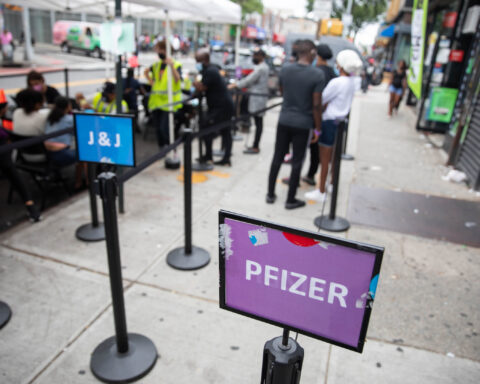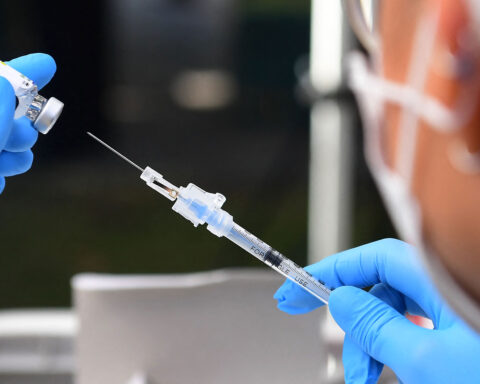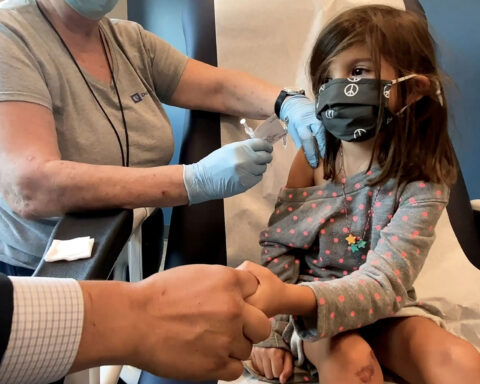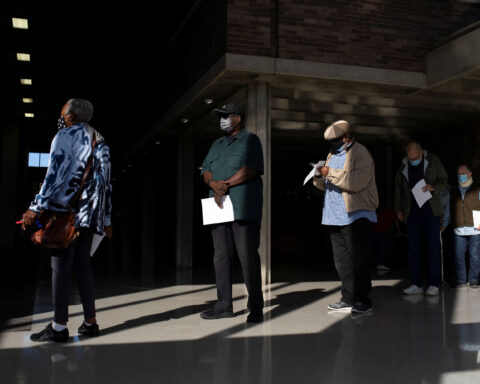US Centers for Disease Control and Prevention Director Dr. Rochelle Walensky endorsed the use of Covid-19 vaccine boosters Friday for all adults.
Walensky made her recommendation just hours after CDC vaccine advisers voted unanimously to recommend booster doses of Pfizer/BioNTech’s and Moderna’s Covid-19 vaccines for all US adults six months after they finish their first two doses.
The recommendations simplify previous, complicated guidance for boosters.
Earlier Friday, the US Food and Drug Administration authorized boosters of the Pfizer/BioNTech and Moderna Covid-19 vaccines for everyone 18 and older.
“CDC continues to encourage the 47 million adults who are not yet vaccinated to get vaccinated as soon as possible to protect themselves, their families, loved ones and communities,” the CDC said in a statement.
“We also strongly encourage those who were already eligible — older populations and individuals with underlying medical conditions — to get boosted before the holidays.”
Previously, boosters had been authorized for anyone 65 and older who was vaccinated with the Pfizer or Moderna vaccines at least six months ago and for certain adults at high risk of infection or of severe disease. Friday’s vote streamlines this, making clear every adult should or may get a booster six months after finishing the first two doses.
Recent real-world studies suggested that immunity from Covid-19 vaccines begins to wane and protection against milder and asymptomatic disease, in particular, may drop. Studies have shown that booster doses restore that immunity.
Members of the CDC’s Advisory Committee on Immunization Practices heard safety data from the CDC, from Pfizer and from Moderna that showed the boosters have not caused worrying adverse events. The most common reactions are pain at the injection site, headache and fatigue.
“After critical scientific evaluation, today’s unanimous decision carefully considered the current state of the pandemic, the latest vaccine effectiveness data over time, and review of safety data from people who have already received a COVID-19 primary vaccine series and booster,” Walensky said in a statement.
“Booster shots have demonstrated the ability to safely increase people’s protection against infection and severe outcomes and are an important public health tool to strengthen our defenses against the virus as we enter the winter holidays,” she added.
“Based on the compelling evidence, all adults over 18 should now have equitable access to a COVID-19 booster dose.”
The vote comes just in time for people to get boosters before the holidays, the CDC’s Dr. Sara Oliver told the meeting. Even if the added immunity given by boosters doesn’t last long, she said, it can help.
“Even temporary protection may factor into the benefit risk balance, especially as we approach the winter holidays with increased travel and holiday gatherings,” Oliver said.
Dr. Anthony Fauci, director of the National Institute of Allergy and Infectious Diseases, told CNN this week that recent data from Israel show that, among people age 60 and older, those who received a booster were less likely to become severely ill than vaccinated people who had not received a booster. Rates of severe disease remained highest among those who weren’t vaccinated.
The majority of adults had already been eligible to receive boosters, and several states have already moved to open up boosters to all adults.
‘Everyone is eligible’
Expanding booster eligibility to all adults in the United States may not change the logistics around getting shots into arms.
The vaccine supply for boosters is already established in many places. There are no “extra steps” on the administration side of the booster rollout that need to happen, Adriane Casalotti, chief of government and public affairs at the National Association of County and City Health Officials, told CNN.
“Looking national, we have enough vaccine. There are lots of places that have appointments. Obviously, that varies a little bit depending upon where you live geographically because there’s more demand in some areas than others,” Casalotti told CNN.
“But that being said, I think the main preparation is on the communication side,” Casalotti added. “The communication for the local health care providers and public health departments is that now you don’t have to worry about eligibility if someone asks if they need to get a booster. This is the information — everyone is eligible after six months.”
Around 32 million people in the United States — about 17% of those who are fully vaccinated — have received a booster dose of Covid-19 vaccine, according to CDC data.
About 18 million seniors have received a booster dose of Covid-19 vaccine, according to CDC data, accounting for more than half of all booster doses administered and increasing the immune response for more than a third of fully vaccinated seniors.
The future of boosters
The US is now averaging 94,943 new Covid-19 cases each day, according to Johns Hopkins University — a 31% increase over last week and back to levels last seen more than a month ago. Midwestern states account for more than a third (38%) of new cases.
There’s concern that winter weather that drives people indoors and holiday gatherings could lead to even more cases.
“We certainly want people to be as well protected as they could possibly be going into the season,” said Dr. Marci Drees, chief infection prevention officer and hospital epidemiologist for Delaware-based ChristianaCare.
Drees is a Society for Healthcare Epidemiology of America liaison to the CDC’s vaccine advisory committee.
“I think we’re at the point now where for lots of people who were vaccinated last winter and spring, now would be the time that their protection is waning,” she said.
Once people do receive their Covid-19 vaccine booster shots, it’s not clear when they might need another vaccine dose — if ever.
“That certainly is the million-dollar question. We know that the boosters boost people’s immunity back up to that 90% to 95% range in the short term. We don’t know how long that will last,” Drees said.
“In some ways, we’re forging a new path — and a lot of it is driven by can we get enough immunity in the population so that we can really shut down further transmission,” Drees said. “We know that boosters are not going to end the pandemic. They will help and prevent people from getting sick, but we really still need to push on getting first and second doses into people as well.”





